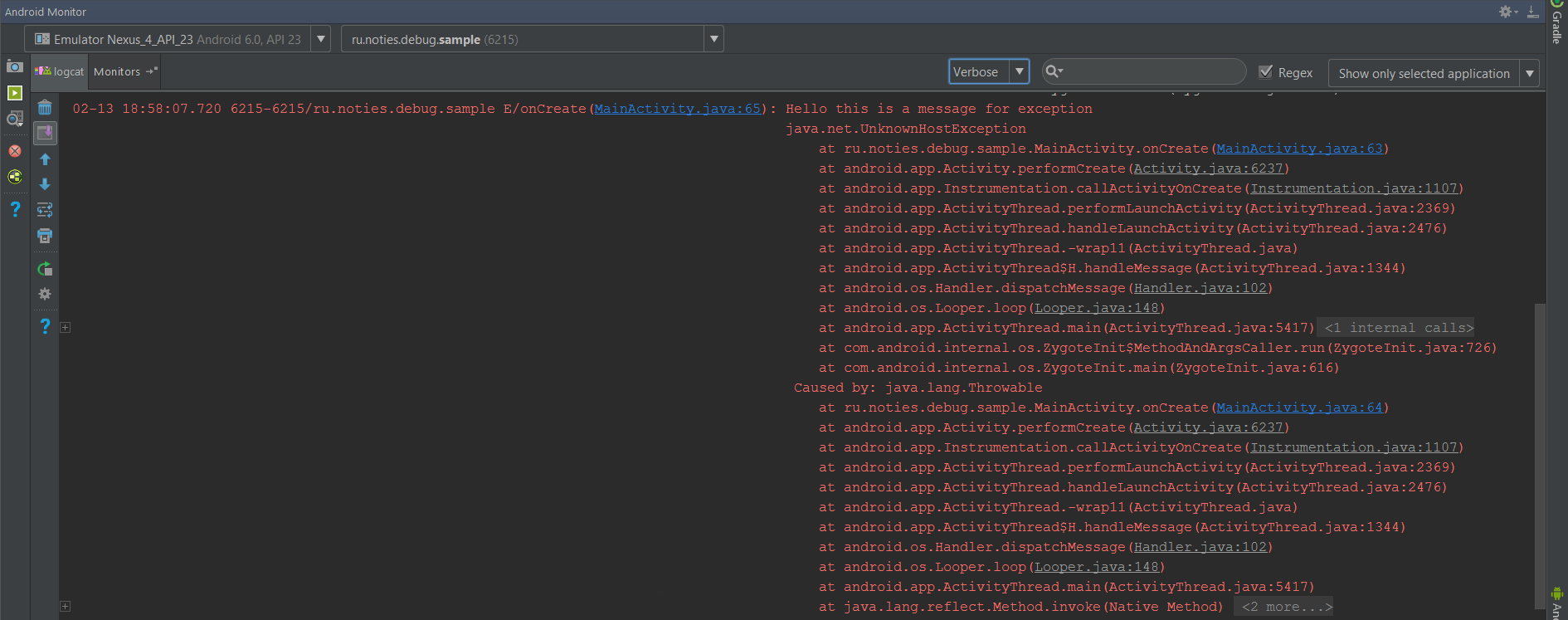Fast, easy and poweful logging utility for Android and Java.
- Automatic tags based on Java class and method name, easy navigation to that call from IDE console output.
- Build-in string formatting
- Customizable outputs ready for extension (console, file, network, etc)
- Easy method chain tracing (current method calls chain that triggered execution), navigatable from IDE console output
All links are clickable and clicking on them will navigate to the referenced method in an IDE:
Quick peek on live templates:
In your dependencies block in build.gradle:
implementation 'io.noties:debug:5.0.0'To start using this library it must be initialized with desired output:
Debug.init(new AndroidLogDebugOutput(/*isDebug*/true)); // BuildConfig.DEBUG can be usedDebug.init() takes an array or a Collection of outputs.
Debug.init(new AndroidLogDebugOutput(true), new SystemOutDebugOutput(true));
final List<DebugOutput> outputs = /*obtain desired outputs)*/;
Debug.init(outputs);If proguard is used this configuration can be used to remove all the log calls:
-assumenosideeffects class io.noties.debug.Debug {
public static *** v(...);
public static *** d(...);
public static *** i(...);
public static *** w(...);
public static *** e(...);
public static *** wtf(...);
public static *** trace(...);
public static *** init(...);
}
Debug has all the default Android log levels: VERBOSE, DEBUG, INFO, WARN, ERROR, WTF. Each level has corresponding Debug method:
Debug.v();
Debug.d();
Debug.i();
Debug.w();
Debug.e();
Debug.wtf();All methods take optional Throwable and Object...
int value = -1;
try {
value = /* obtrain value */;
Debug.i("obtained value: %d", value);
} catch (Throwable throwable) {
Debug.e(throwable);
Debug.w(throwable, "Exception executing try code block... value: %d", value);
}If first argument is a String that has valid String.format modifiers, than String.format will be used with first argument as a pattern and all the rest arguments as String.format arguments
Debug.i("%1$d + %1$d = %2$d", 2, (2 + 2)); // -> "2 + 2 = 4"
Debug.i(throwable, "%1$d + %1$d = %2$d", 2, (2 + 2)); // -> "2 + 2 = 4" + throwable stacktraceElse all arguments will be concatted into one string:
Debug.i("first", 2, true, "forth", null); // -> "first, 2, true, forth, null"Will print method chain calls that triggered with log call
Debug.trace();
Debug.trace(int maxStack);
Debug.trace(Level level);
Debug.trace(Level level, int maxStack);There is a file with basic templates: templates_io_noties_debug.xml.
Learn how to add custom live templates to a IDEA IDE
The shortkeys are (works in Kotlin and Java):
dv [tab] -> Debug.v();
dd [tab] -> Debug.d();
di [tab] -> Debug.i();
dw [tab] -> Debug.w();
de [tab] -> Debug.e();
There are also shortkeys to parse current method arguments and prepare a valid Debug.* call, for example (works only in Java):
void someMethod(int i, double d, String s) {
// try `dii` shortcut
Debug.i("i : %s, d: %s, s: %s", i, d, s); // here is what will be generated
}These are as follows:
dvv [tab]
ddd [tab]
dii [tab]
dww [tab]
dee [tab]
public interface DebugOutput {
void log(
@NonNull Level level,
@Nullable Throwable throwable,
@NonNull String tag,
@Nullable String message
);
boolean isDebug();
}Just implement DebugOutput and pass an instance of it to the Debug.init call
- Maven artifact location change:
ru.noties:debug->io.noties:debug - Package change
ru.noties.debug->io.noties.debug
- Removed
debug-removeaftifact - Added nullability annotations where matter
- Overloaded some logging methods to not create an array of arguments with each call
- Added array handling for arguments (automatically expanded via
Arrays.deepToString() DebugOutputContaineris initialized once (during creation), if aDebugOutputreturnsfalsefrom debug (during configuration) it won't be included- Added
ru.noties.Debugas default tag when caller tag cannot be obtained via reflection (better display in logcat)
Debug.init()now takes an array or a Collection ofDebugOutput's (no need to create aDebugOutputFacade(which is removed BTW)- If multiple
DebugOutput's must beflattenedin oneDebugOutputuseDebugOutputContainer(which is used by default ifDebug.initis called with multiple outputs) - Removed
ru.noties.debug.outpackage ru.noties.debug.out.DebugOutput->ru.noties.debug.DebugOutputru.noties.debug.out.AndroidLogDebugOutput->ru.noties.debug.AndroidLogDebugOutput- All
Debug.*calls now accept an array of arguments (previously one would have to create a formatted string for that:Debug.i("%d, %d, %d, %d", 2, 3, 4, 5);, now:Debug.i(2, 3, 4, 5); - Added
io.noties.debug.SystemOutDebugOutputfor writing logs toSystem.out&System.err(can be used in plain Java projects, or in test environment) - Removed Timer
- Removed
library-uimodule (discountinued) - Removed
apt-compiler&apt-annotationsmodules (discontinued)
Copyright 2017 Dimitry Ivanov (legal@noties.io)
Licensed under the Apache License, Version 2.0 (the "License");
you may not use this file except in compliance with the License.
You may obtain a copy of the License at
http://www.apache.org/licenses/LICENSE-2.0
Unless required by applicable law or agreed to in writing, software
distributed under the License is distributed on an "AS IS" BASIS,
WITHOUT WARRANTIES OR CONDITIONS OF ANY KIND, either express or implied.
See the License for the specific language governing permissions and
limitations under the License.



